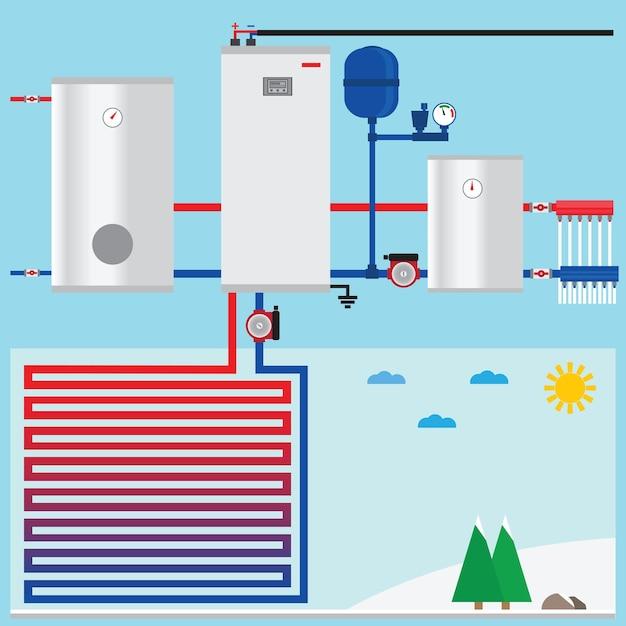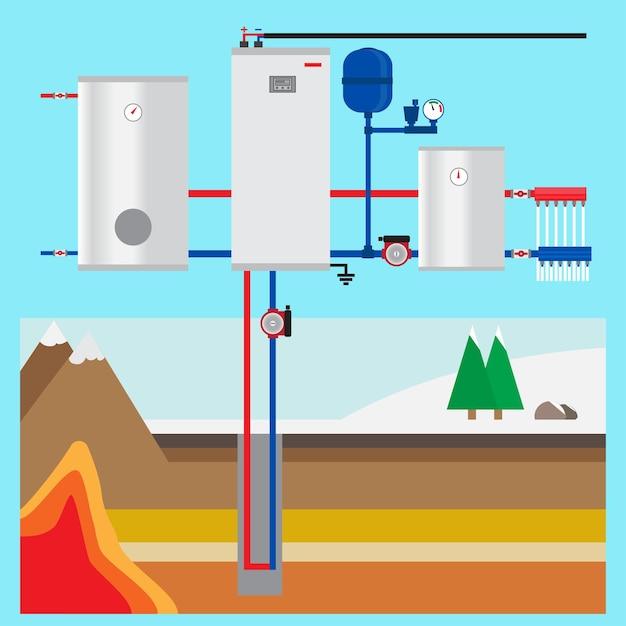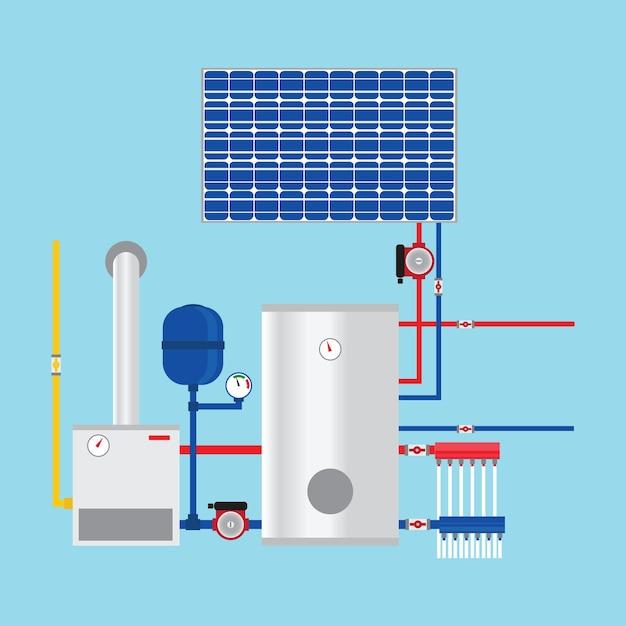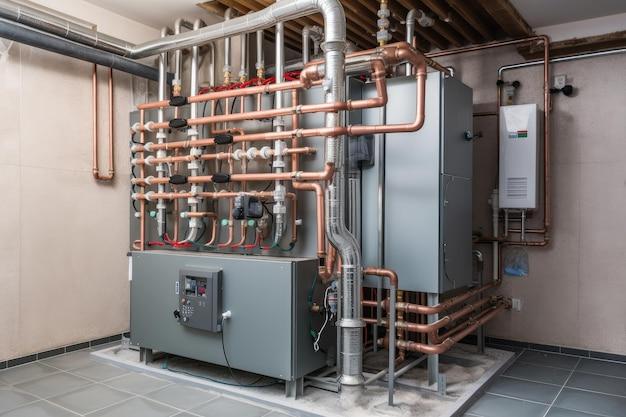Are you tired of running out of hot water in the middle of your shower? Or maybe you cringe every time you see your energy bill skyrocket due to your traditional tankless water heater? Well, it might be time to consider a heat pump water heater. But wait, how do they actually work, and do they really live up to the hype? In this blog post, we’ll explore the inner workings of heat pump water heaters, dispel any doubts you may have, and even discuss the potential disadvantages. So, let’s dive in and unravel the mystery behind heat pump water heaters!
How Does a Heat Pump Water Heater Work
Understanding the Magic Behind Heat Pump Water Heaters
Do you find yourself shivering in front of the shower while waiting for the water to heat up? Nobody wants that! Thankfully, there’s a nifty little invention called a heat pump water heater that can put an end to your cold water misery. But how does it work? Prepare to have your mind blown!
The “Heat Pump” Conundrum
Okay, let’s break it down. Contrary to what you might think, a heat pump water heater doesn’t actually create heat. Instead, it works its magic by moving heat from one place to another. It’s like having a personal chauffeur for heat!
The First Step: Heat Extraction
The process begins with the heat pump pulling in surrounding air. Then, this cunning heat pump extracts the heat energy from the air and transfers it to a refrigerant fluid that circulates inside the system. Be prepared for your heat pump to be quite the little thief!
The Second Step: Heat Transfer
Once the heat is in the refrigerant fluid, it’s ready for a joyride! This fluid travels to a compressor, which increases its pressure and temperature. Think of the heat pump as a pumped-up heat superhero, ready to fight off the chill!
The Final Step: Heat Delivery
Now for the coup de grâce! The heat pump water heater channels the hot refrigerant fluid to a heat exchanger located inside a tank of water. As the refrigerant releases its stolen heat to the water, it cools down and transforms back into a liquid state. It’s basically a heat laundering operation!
Saving Energy, One Heat Pump Water Heater at a Time
You might be wondering, “Is this witchcraft? How can it save energy?” Well, my friend, by utilizing heat that already exists in the air, rather than generating heat from scratch, a heat pump water heater can be up to three times more efficient than your typical electric water heater. That’s like going from muggle to wizard in the blink of an eye!
If you want to join the energy-saving party and bid farewell to icy showers forever, a heat pump water heater might just be the magical solution you’ve been waiting for. Say goodbye to cold mornings and hello to a toasty, eco-friendly future!
Tankless Water Heater
Say goodbye to long showers
If you’re tired of running out of hot water in the middle of a long, luxurious shower, then a tankless water heater might be just what you need. These handy devices provide hot water on demand, meaning you’ll never have to worry about emptying the hot water tank again.
How does it work
Unlike traditional water heaters that store a limited amount of hot water in a tank, a tankless water heater heats the water as it flows through the unit. This means that you’ll always have hot water whenever you need it, without having to wait for a large tank to refill.
Endless hot water, unlimited possibilities
Imagine never having to rush through your morning routine to beat the hot water rush again. With a tankless water heater, you can take your time and enjoy a leisurely shower, knowing that hot water is always just a turn of the faucet away.
Energy-efficient and environmentally friendly
Not only do tankless water heaters provide endless hot water, but they are also more energy-efficient than traditional water heaters. By only heating the water when it’s needed, these units can help you reduce your energy consumption and lower your utility bills.
Small size, big benefits
Another great advantage of tankless water heaters is their compact size. Unlike bulky traditional water heaters, tankless units can be installed in small spaces, making them perfect for apartments, condos, and other spaces where space is limited.
Whether you’re tired of running out of hot water or looking to save energy and space, a tankless water heater is a great investment. With their on-demand hot water and energy-efficient operation, these devices provide the perfect solution for all your hot water needs. Say goodbye to cold showers and hello to endless hot water with a tankless water heater!
Do Heat Pump Water Heaters Really Work
When it comes to heat pump water heaters, you might find yourself wondering, “Do these things really work, or are they just another gimmick?” Well, let me tell you, my skeptical friend, heat pump water heaters are no joke!
How They Work: A Sneak Peek Behind the Curtain
So, you’re probably wondering, “How on earth can a heat pump water heater extract heat from the air to warm up my water?” It’s like magic, but instead of pulling a rabbit out of a hat, it’s extracting heat out of thin air! These ingenious appliances use a clever combination of electricity and refrigerant to snatch that heat and transfer it to your water.
Benefits: More Bang for Your Buck
Now, you might be thinking, “Okay, fine, they technically work, but are they worth it?” And boy, oh boy, are they worth it! Heat pump water heaters are like the superheroes of energy efficiency. They can cut your water heating costs by up to 50% compared to traditional water heaters. Plus, they produce fewer greenhouse gas emissions, so you can feel good about saving the planet while enjoying that hot shower.
Not a One-Trick Pony: Year-Round Performance
But wait, there’s more! Heat pump water heaters aren’t just here for the winter. They’re ready to work their magic all year round. Even in colder climates, these bad boys can extract heat from the air and provide you with hot water, all while doing a little happy dance for being so incredibly efficient. So don’t worry about those freezing winter mornings; your heat pump water heater has got your back!
The Noise Dilemma: The Sweet Symphony of Efficiency
Now, you might be concerned about noise. After all, who wants a water heater that sounds like a marching band practicing in their basement? Fear not, my friend, because heat pump water heaters operate with a level of quietness that would make a ninja jealous. So rest easy knowing that your peaceful nights won’t be disturbed by the water heater’s symphony.
Conclusion: Believe in the Magic
In conclusion, dear reader, heat pump water heaters are no illusion. They are the real deal, delivering energy efficiency, cost savings, and reliability in one nifty package. So the next time you doubt the wonders of heat pump water heaters, just remember that they’re out there, doing their thing, and making hot water dreams come true. It’s like having a friendly little magician in your basement, but instead of pulling rabbits out of hats, it’s pulling hot water out of thin air!
Remember, if you’re still skeptical, give heat pump water heaters a chance, and you’ll soon be singing their praises. Trust me, you won’t be disappointed!
Disadvantages of Heat Pump Water Heaters
Higher Upfront Cost
While heat pump water heaters can save you money in the long run, one of the main disadvantages is their higher upfront cost compared to conventional water heaters. These high-tech marvels don’t come cheap, so be prepared to dig a little deeper into your pockets when making the initial purchase. But hey, who needs money anyway when you can have the latest water heating technology, right?
Requires Sufficient Space
Another thing to consider before jumping on the heat pump water heater bandwagon is the amount of space they require. These units are generally bulkier and need proper ventilation to function efficiently. So, if your home is already cramped and cluttered with your collection of vintage sock puppets, you might want to think twice before squeezing a heat pump water heater into the mix.
Can Be Noisy
Now, I don’t know about you, but I like my home to be a peaceful sanctuary, free from unnecessary noise. Unfortunately, heat pump water heaters might have other plans. These machines can be a bit noisy, with all the whooshing and humming sounds they make. If you’re the type of person who appreciates silence or wants to avoid the wrath of a grumpy partner, it’s something worth considering.
Climate Sensitivity
Heat pump water heaters are a bit like delicate flowers that thrive in specific climates. They work best in moderate to warm temperatures, so if you live in an icy winter wonderland, their performance might be impacted. These units extract heat from the surrounding air, and if it’s too cold, they might struggle to operate efficiently. Guess they’re not fans of snowball fights!
Longer Recovery Time
When your newfound obsession with long, luxurious showers takes over, you might notice a slight inconvenience with heat pump water heaters. Compared to conventional models, they have a slower recovery time. So, if you have a household of busy bees taking back-to-back showers, you might experience a temporary cold water interruption. Better make those shower goals more efficient or deal with a chilly surprise!
Increased Complexity
Finally, heat pump water heaters can be a little more complex than their traditional counterparts. This means that if something goes wrong, you might need a specialized technician to fix it. Cue the dreaded repair bill! So, if you like to tinker with your appliances or have a mini-journeyman lurking within you, this might not be the most enjoyable aspect. Time to call in the experts and leave the repair work to the pros!
Now that we’ve explored the disadvantages, it’s important to remember that every technology has its downsides. Despite these not-so-convenient aspects, heat pump water heaters remain an energy-efficient and eco-friendly option worth considering. So, weigh the pros and cons (or should I say the heat and cold?) and make an informed decision for your water heating needs!



